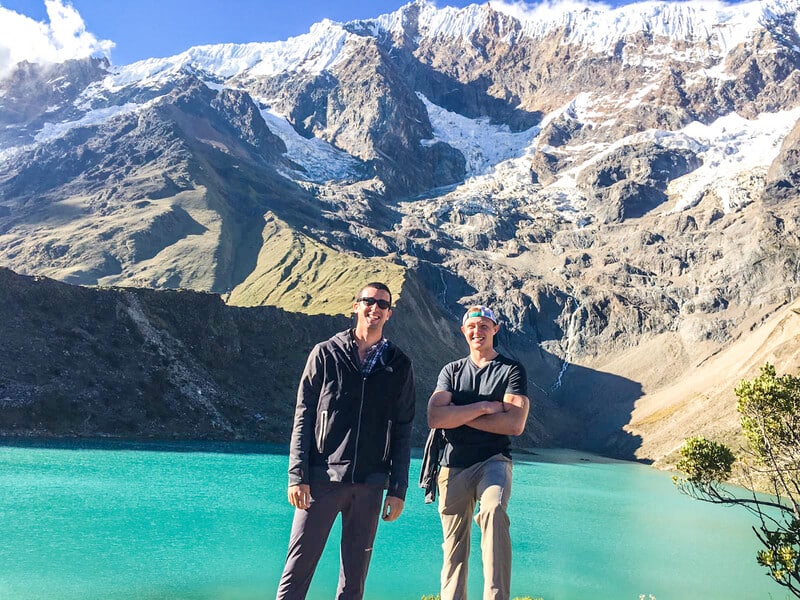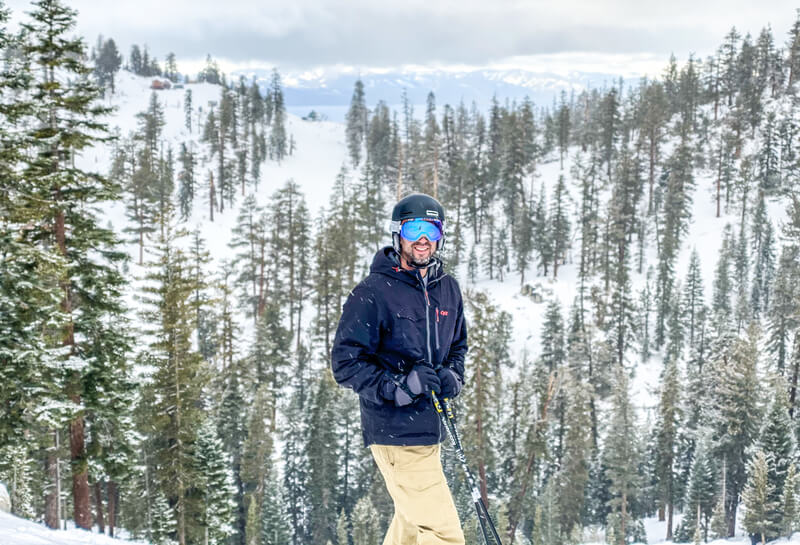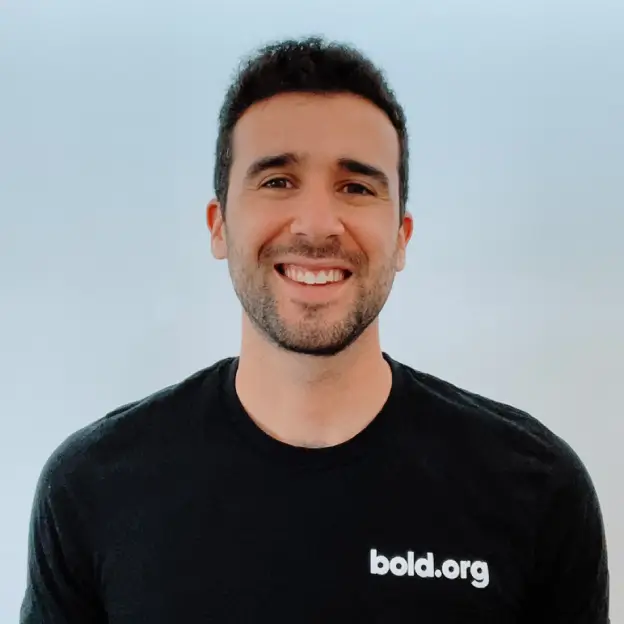Life Reimagined Insights with Entrepreneur Dror Liebenthal
Meet Dror Liebenthal, the ambitious CEO of Bold.org who is reimagining the world of philanthropy.
I first met Dror at Princeton University in 2011. Since then, we’ve worked together at three companies, traveled to 10+ countries, and helped each other grow as people and professionals.
Over the years, I’ve been impressed with how Dror has systematically prioritized learning and applied first principles thinking to his decision-making processes.
Dror has also rapidly ascended in the world of startups. He’s now one of the best startup operators, builders, and leaders I know.
What’s awesome about Dror is that he’s applying his intelligence, expertise, and tenacity to solving hard problems that improve the quality of people’s lives at scale. Along the way, he continues to be a compassionate person, a man of integrity, a wonderful friend, and someone who appreciates the value of family.
I’m thrilled to share my interview with Dror in which he discusses his life story, most valuable habits, leadership lessons, and how he’s disrupting the world of philanthropy with Bold.org.
Who is Dror Liebenthal?
Dror Liebenthal is the CEO and Cofounder of Bold.org — a high-growth platform that works with students and donors to make it easy for anybody and any company to easily create and manage scholarships, fellowships, and grants.
Dror was born in Israel and, after immigrating to the US, was the first in his family to navigate the US education system, with scholarships opening critical educational doors along the way. Dror has a BSE in Chemical and Biological Engineering from Princeton University.
Today, Dror leads Bold.org’s product scaling, team growth, and operations. He also oversees philanthropic efforts with donors as President of the Bold Foundation.
You moved around a lot growing up. How did your childhood shape your understanding of the world?
It made me a lot more resilient, self-reliant, and globally-minded. When we moved to the US (I was 4), I didn’t speak any English. My first kindergarten teacher thought I was a slow learner and poorly behaved until she realized I didn’t understand what anyone was saying.
You learn to figure things out really fast in environments like that.
Later on, when I moved to Canada, I transitioned to a new school where I had already completed all the math classes they offered. I ended up teaching myself math via textbooks and online courses for the next 3 years until I graduated. I’m much more confident and comfortable today in teaching myself new skills as a result.
Finally, moving so much meant that I didn’t really have strong ties to any one city (and by extension, any one ideology or culture). That was part of why, when I finished college, I ended up working remotely while traveling internationally in dozens of countries for almost 3 years.

What did your parents teach you that still sticks with you today?
I have endless lessons from my parents that influence me today, both consciously and subconsciously. The strongest ones are:
Hold high standards for yourself.
No matter what you choose to do with your time – or life, or education, or career — make sure to do it to the absolute best of your abilities.
It’s going to be ok.
My parents are both really calm. An important lesson they taught me was that no matter what’s going on, it’s going to be ok. The vast majority of problems just aren’t that big of a deal, especially in hindsight. From their influence, I try to not get too high when something good happens, and to not get too low when something goes wrong.
Tremendous impact starts with small actions
Quoting an Israeli cult classic, my dad often says: “The best way to win a marathon is to start running as fast as you can, and then slowly increase your speed.”
This is my favorite lesson. Basically, it means that you need to just start and keep going. Don’t worry about where you’re at today. Focus on being better tomorrow.
How’d you end up at Princeton University?
I was the first in my family to navigate the US college system, and very few students from my high school (in Canada) went to school in the US. So, I was definitely making it up on the fly to some extent.
I knew I wanted to attend a great school with a great engineering program, and I applied to the top 4-5 schools that met that criteria. I hadn’t heard of the concept of a “safety school” at this point. I studied for standardized tests through some free websites that I found online, and I finished some application essays a day before the deadline from an internet cafe while I was on a family trip back to Israel.
I didn’t do any “college visits” or anything like that. I’m not even sure I could have told you where Princeton was at the time. I wouldn’t necessarily recommend my approach to anyone, but it worked out for me. Knowing what I know now, I feel really lucky. My time at Princeton was extremely formative.
You’re one of the hardest working and most focused people I’ve met. How do you stay so focused over the long run?
I love the process. It is so incredibly rewarding to work really hard to figure something out and get rapid feedback on the results of your efforts. It’s more about the process than the destination for me.
An effective way to do this is by setting goals that make sense for where you are right now, not where you hope to be in a year or two. It’s really demoralizing to set an ambitious goal and feel like you aren’t getting any closer to achieving it. Instead, I try to focus on goals that can be achieved within hours, days, or (at most) weeks.
I also try to minimize distractions and focus on the few things that are most important to me – both in and out of work. There’s a famous engineering problem that essentially boils down to: all else being equal, if you have a bunch of projects, would you rather do them sequentially or in parallel?
The right answer is to do them sequentially so that you can begin accruing the benefits of the ones you completed first while you work on the others. I try to focus on doing very few things extremely well.
At a relatively young age, you’ve ascended in leadership at large organizations and started your own company. What’s been your biggest challenge as a leader?
I’ve made so many mistakes in leadership. I feel like I constantly look back with embarrassment at how I used to lead 6 months ago compared to today.
One area where I struggle and constantly try to improve is in adapting to different working styles.
People are often so different in their motivation, the type of work they enjoy/don’t, and where they excel/don’t. Teams function so much better when you have that range of personalities and backgrounds, and unlocking that full potential means adapting your leadership style to each individual person.
To do that, you have to get out of your comfort zone and appreciate that your first instincts might be wrong. Not everyone thinks like you.
I still don’t think I’m very good at this, but I’m getting better. I used to be much worse.
What is one of the best or most worthwhile investments you’ve ever made?
A few years ago, I started exercising consistently, and it has had such an incredibly positive impact on my daily life. Growing up, I played a lot of sports, and I really missed that in the first few years of my career. I found it a lot harder to find a pick-up basketball game while traveling.
I started making exercise a non-negotiable part of my routine, and almost immediately started feeling so much sharper, more creative, happier, and more energetic. Today, I alternate between a bunch of different workouts (weights, cycling, yoga, hiking, and skiing). The specific form of exercise doesn’t really matter to me as long as I stay active.

Given the choice of anyone in the world, whom would you want as a dinner guest? (They can be dead or alive).
Right now, I’d love to have Adam Grant as a dinner guest. I love his books (Give and Take, Originals, and most recently Think Again) — they’ve strongly influenced how I think about communicating, collaborating, and leading.
You’re now the Founder and CEO of Bold.org, an organization committed to fighting student debt. What do you hope to build over the next few decades?
Bold.org makes it easy for any person or company to give back in an amazing way. It’s a customized, high-impact, full service philanthropy platform for scholarships, fellowships, and grants.
We’re proud of the impact we’ve enabled so far for donors and students, and we’re just getting started.
Our mission is to fight student debt, and scholarships are just one part of that. As we grow Bold.org, we’re going to support millions of students through every step of that journey as they get off to the best part possible.
What’s broken about the classic philanthropy model?
Non-profits are generally (almost by definition) donation-dependent, and donors want to know where their money is going. This makes sense; if you make a donation, you’d much rather see it go toward someone in need than toward someone’s salary, some marketing campaign, or some experimental new initiative.
The problem is that all of those things drive growth in an organization. To grow your impact, you need to hire great people, have great marketing campaigns, and try ambitious projects that you aren’t always sure will work.
The unintended consequence of the donation-dependent model is that non-profits struggle to scale and take the risks necessary to unlock potential impact. They also have extremely high turnover as their team members burn out.
More than anything else, these challenges limit the potential impact of most non-profits for the people they’re trying to help.
For more on this topic, I strongly recommend listening to Dan Pallotta’s TED Talk: The Way We Think About Charity Is Dead Wrong. It’s an exceptionally clear, concise primer on the challenges non-profits face.
What do most people get wrong about entrepreneurship?
Most people think you have to know a lot more than you really do to get started.
You really don’t have to know anything about, well, anything to get started. Marketing, sales, finance, governance, etc. etc. are all things you’ll figure out along the way. You’ll learn them a lot faster than you think.
There are amazing and free online resources available for the vast majority of entrepreneurship topics. You can learn how to incorporate a company with minutes or hours of research. You can teach yourself to become an amazing marketer or product leader really quickly if you read a lot, work hard, and are comfortable failing frequently along the way.
To get started, you just need…to start.


